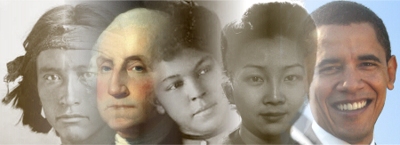Sojourner Truth (1797-1883) started out life in slavery. She was freed in 1827 and became an evangelist, preacher, abolitionist, and woman's rights advocate. Her most famous speech is "Arn't [Ain't] I a Woman?" one of the most powerful in American history.
Truth gave the speech at the first Woman's Rights Convention in Akron, Ohio in 1851. She never wrote the speech down, so the versions that exist today are based upon what people remember from hearing it. There are many different versions. Below are two.
The first very short account of Truth's speech was published in the June 21, 1851 issue of the Anti-Slavery Bugle, edited by Marcus Robinson.
Look at Me! Look at my arm. I have plowed, I have planted and I have gathered into barns. And no man could head me. And ain't I a woman?
I could work as much, and eat as much as a man -- when I could get it -- and bear the lash as well! And ain't I a woman? I have borne children and seen most of them sold into slavery, and when I cried out with a mother's grief, none but Jesus heard me. And ain't I a woman?
Frances Dana Gage, who was present and a presiding officer at the 1851 Convention published a longer version of the speech. It was printed in the Anti-Slavery Standard (May 2, 1863) and in The History of Woman Suffrage, volume 1, co-authored with Susan B. Anthony, (1881). Gage's version was written in dialect which today is considered offensive. This version is from the Internet Modern History Sourcebook (Paul Halsall, Aug. 1997), is without Gage's dialect.
Well, children, where there is so much racket there must be something out of kilter. I think that 'twixt the negroes of the South and the women at the North, all talking about rights, the white men will be in a fix pretty soon. But what's all this here talking about?
That man over there says that women need to be helped into carriages, and lifted over ditches, and to have the best place everywhere. Nobody ever helps me into carriages, or over mud-puddles, or gives me any best place! And ain't I a woman? Look at me! Look at my arm! I have ploughed and planted, and gathered into barns, and no man could head me! And ain't I a woman? I could work as much and eat as much as a man - when I could get it - and bear the lash as well! And ain't I a woman? I have borne thirteen children, and seen most all sold off to slavery, and when I cried out with my mother's grief, none but Jesus heard me! And ain't I a woman?
Then they talk about this thing in the head; what's this they call it? [member of audience whispers, "intellect"] That's it, honey. What's that got to do with women's rights or negroes' rights? If my cup won't hold but a pint, and yours holds a quart, wouldn't you be mean not to let me have my little half measure full?
Then that little man in black there, he says women can't have as much rights as men, 'cause Christ wasn't a woman! Where did your Christ come from? Where did your Christ come from? From God and a woman! Man had nothing to do with Him.
If the first woman God ever made was strong enough to turn the world upside down all alone, these women together ought to be able to turn it back , and get it right side up again! And now they is asking to do it, the men better let them.
Obliged to you for hearing me, and now old Sojourner ain't got nothing more to say.
Internet Modern History Sourcebook
(http://www.fordham.edu/halsall/mod/modsbook.html)
Return to Speeches

